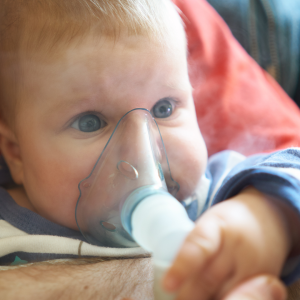RSV in Young Children: Symptoms, Treatment and When to Seek Medical Help
 Pay closer attention to your children’s cold symptoms this fall, especially if they are very young or immunocompromised. The protection afforded by widespread mask usage in 2020 and 2021 has evaporated in 2022, and hospitals are seeing high rates of respiratory syncytial virus (RSV) in young children this fall.
Pay closer attention to your children’s cold symptoms this fall, especially if they are very young or immunocompromised. The protection afforded by widespread mask usage in 2020 and 2021 has evaporated in 2022, and hospitals are seeing high rates of respiratory syncytial virus (RSV) in young children this fall.
“RSV is a virus people can get each year since protection after having RSV is not lifelong,” said Virginia Dolan, MD, a pediatrician with Memorial Care. “However, after our first episode of RSV, we have greater protection than we had before. As a result, RSV poses the greatest risk for those young children experiencing it for the first time, generally those under 6 months old.”
The first two days of symptoms may be less dramatic, with potential worsening on days 3 – 4. Children may worsen quickly and need close watching.
RSV Symptoms:
- Coughing
- Runny nose
- Sneezing
- Wheezing
- Little appetite
- Fever
- Irritability
- Lethargy
Most RSV cases resolve within a week or two. Over-the-counter pain and fever medications may provide some relief of mild symptoms, but always check with your child’s pediatrician before using non-prescription cold medicines.
Unfortunately, RSV can progress into something more serious, especially for children with underlying health issues. The Centers for Disease Control and Prevention (CDC) estimate that RSV sends more than 58,000 children under the age of 5 to the hospital each year. Premature infants; babies 6 months and younger; children 2 and younger with chronic lung disease, congenital heart disease or weakened immune systems; or children of any age who have difficulty swallowing or clearing mucus secretions are at higher risk for complications from RSV.
RSV Prevention Tips
Prevention includes familiar advice: avoid close contact with sick people, clean and disinfect surfaces, wash hands regularly, cover mouth for a sneeze or cough and avoid touching your face with unwashed hands. Also, if you have any cold symptoms at all, refrain from kissing infants or toddlers or singing, speaking or cooing to them in close contact.
Dr. Dolan also recommends washing toys and wiping down doorknobs since the virus can live on surfaces for up to six hours.
“Realize that it is impossible to keep your child from ever getting RSV – it’s just a matter of when,” she said. “But when RSV is in your community, and you have an infant, it is reasonable to try and reduce exposure to groups of people since it is spread by direct person-to-person contact.”